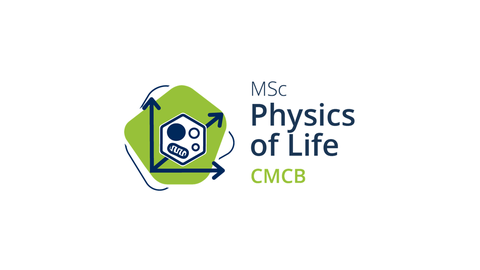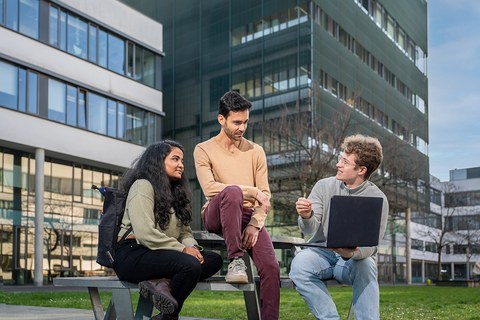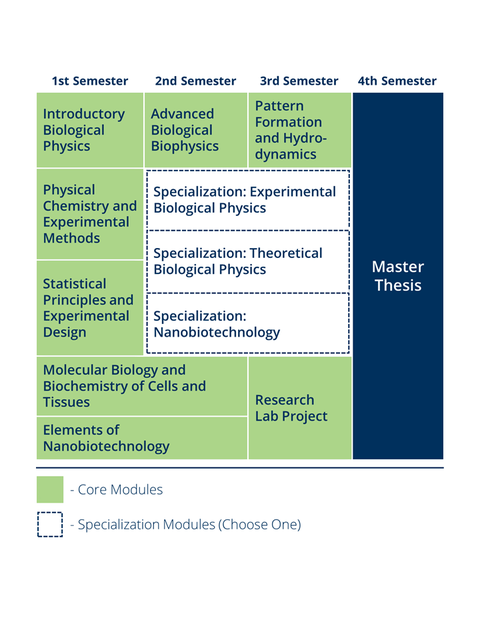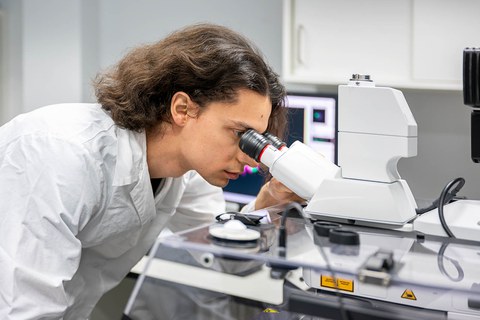Physics of Life
Inhaltsverzeichnis
Modern Biophysics - From Molecules to Organisms
Which equations determine the motion of molecules in an organism?
How do cells generate and distribute energy to keep themselves alive?
What makes tissues deform into distinct shapes when an embryo evolves?
How can we measure the forces in cells and tissues?
Physics of Life at a Glance
| Degree | Master of Science |
| Language | English |
| Tuition | None |
| Start | Winter Semester (October) |
| Duration | 4 semesters (3 semesters of coursework and lab classes + 1 semester for Master's thesis) |
| Internationality | Approximately 70% of students come from outside Germany |
Why Physics of Life Master's Program?
Biological Physics combines the power of physics and the complexity of biological systems. If you enjoy applying mathematical models and physical principles, then this field opens the door for you to cutting-edge research at the intersection of multiple disciplines including physics, biology, chemistry, and medicine. The international Master of Science in Physics of Life provides a unique opportunity to learn how to solve exciting real-world biological problems through a physicist's lens.
If you are intrigued by the "how" and "why" of life at a fundamental level — how proteins fold, how cells communicate, or how organisms develop — biological physics provides a versatile platform to explore these questions in detail, using the rigorous, quantitative methods of physics. From addressing modeling of pandemics to designing bioengineered tissues, the field of biological physics has an immediate and long-term impact with ample opportunities inside and beyond academia.
By combining computational models and experimental techniques, you will learn how to tackle open problems in biophysics from different angles. Through lab courses and rotations, programming tutorials, and a research-oriented Master’s thesis, you will gain first-hand research experience.
Teaching Staff
Experience state-of-the-art teaching by the experts in one of the biggest biophysics communities worldwide.
In Physics of Life Master's program, you will benefit from the wealth of knowledge brought by distinguished researchers from the Cluster of Excellence Physics of Life (PoL) and their esteemed colleagues from the CMCB institutes (BIOTEC, B CUBE, CRTD) and our partner institutions such as the Max-Planck Institute for Physics of Complex Systems (MPI-PKS), the Max-Planck Institute of Molecular Cell Biology and Genetics (MPI-CBG), the Max Bergmann Center for Biomaterials (MBZ), the Leibniz-Institutes for Polymer Research Dresden (IPF), and Leibniz Institute for Solid State and Materials Research Dresden (IFW).
Erasmus Mundus Program
The Physics of Life Master's program is also part of the Erasmus Mundus Master's program Nanoscience and Nanotechnologie (EMM-Nano). In the framework of this program, students can spend their first year at KU Leuven (Belgium) and the second year at one of the other participating universities, depending on their choice of specialization. Students choosing the specialization Biophysics are registered in the Master's program. More information on the program incl. the application requirements and deadlines can be found at the EMM-Nano website.
Career Prospects
The Physics of Life Master's program is a gateway to exciting research career pathways. Because the program is highly research-oriented, our graduates will gain an invaluable hands-on experience. Equipped with these skills, PoL alumni can shape their careers as researchers in academic institutions, start-ups, biotech, and pharma companies.
Scholarships Available!
We’re thrilled to announce that three scholarships will be awarded to students starting the Master's program Physics of Life (PoL) in October 2025.
Each scholarship, funded by the Association of Friends and Sponsors of TU Dresden (GFF), provides €300 per month for one year.
No separate application is needed!
All admitted applicants will automatically be considered. The PoL Selection Committee, in cooperation with the GFF, will make the final decisions alongside admission results.
Curriculum
First Semester
In the first semester, the students will dive into the exciting world of biophysics, polymer physics, physical and biological chemistry, molecular cell biology, and experimental design. These courses will let you explore the building blocks of life and their interactions. It's not all theory though, you will also get hands-on practicals and computational biology projects.
Second Semester
In the second semester, students explore stochastic processes, continuum descriptions of living matter, mechanobiology, biological physics of molecular machines, as well as the fascinating realms of cell and tissue biology.
Three Specializations
Already in the second semester, students choose their path by focusing on one of three specializations:
- Experimental Biological Physics
- Theoretical Biological Physics
- Nanobiotechnology
Each specialization offers a unique set of elective courses tailored to deepen your expertise.
Third Semester
In the third semester, students delve deeper into topics such as pattern formation and active matter theory, while also attending courses in their chosen specialization. Additionally, students start an extensive lab project, that can either broaden their horizons or already lay groundwork for their Master's thesis.
Master's Thesis
In the fourth semester, students dedicate their time exclusively to their Master's thesis. The theses are part of ongoing real-life scientific projects within the research groups associated with the Cluster of Excellence Physics of Life (PoL), as well as B CUBE, BIOTEC, and CRTD. Additionally, students have the opportunity to work at other TU Dresden departments or our partner institutions.
Application Requirements
We encourage highly qualified students of all nationalities to apply.
Applicants must fulfill the following requirements:
Bachelor's degree, Diploma degree, or an equivalent qualification in one of the following fields:
- Physics
- Biophysics
- Applied Mathematics
- Engineering and Nanotechnology
- Quantitative Biology with a strong background in Physics education
- Or related subject with a strong background in Physics education
- diploma of secondary school or university completed in English
- TOEFL: minimum 92 points internet-based
- IELTS: minimum 6.5
- certificates of other tests of equivalent standard will also be considered, e.g., UniCERT, CAE, CPE
- Good knowledge of:
- fundamentals of physics, including mechanics and statistical physics
- linear algebra, calculus, and differential equations
- Basic knowledge in chemistry and biology.
Please note that Chinese, Vietnamese and Indian applicants need to provide the APS certificate (Akademische Prüfstelle) from Academic Evaluation Centre of the German Embassy.
Please note that the German text of the official publication is the authoritative version. The English version is a courtesy translation. In case of ambiguity, please refer to the German documents.
The application period runs from April 1 - May 31 for admissions in winter term.
You'll find complete information on the application procedure on the How To Apply website below.
Early Application
For US and other international students with early deadlines, we welcome and encourage you to apply for the MSc before the standard application deadline. We offer early review of applications on a rolling basis, thus decisions on acceptance can be made sooner. If interested, please write to the study coordinator:
PhD Early Admission
Through a cooperation between the Dresden International PhD program (DIPP) and the CMCB, there is a possibility for an early admission for a PhD within the DIPP program. Selected students have an option of starting a PhD after their 3rd semester of Master's program. The decision is made based on performance and reference letters.
Admitted students may either directly enter the PhD program without completing the Master's degree or first complete the MSc, and then join the PhD program.





